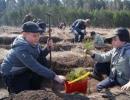Dictionary of basic terms and concepts of the course. Meaning "Abstract Vocabulary Concrete Vocabulary
Dictionary of linguistic terms
Abstract vocabulary
(lat. abstractus - remote, abstract) A set of words with an abstract meaning of quality, property, state, action. Usually, this number includes only abstract nouns that have a grammatical expression of the category of abstraction (certain derivational suffixes, the absence, as a rule, of a plural form, incompatibility with cardinal numbers). Shine. Fuss. hardening. The study. Industrialization. Property. Essence. Silence. Enthusiasm. In a broad sense, proceeding only from the semantic principle, words of other parts of speech can also be included in the abstract vocabulary. So, comparing, on the one hand, the adjectives stone, round, blue, loud, sweet, fragrant, rough, etc., denoting external materialized signs perceived by one of the senses, and on the other hand, adjectives kind, sincere, experienced, moral, smart, sad, lazy, etc. (especially adjectives formed from abstract nouns), we find in the second group words with a greater degree of abstraction, which, with the specified reservation, i.e. That is, without taking into account grammatical indicators, it can be classified as abstract vocabulary. A similar distinction can be made between concrete action verbs (write, read, chop, walk, throw, etc.) and verbs expressing feelings, inner state, etc. (love, hate, have fun, be sad, hope, etc.). etc.): verbs of the second group have a more pronounced abstractness ( cf. their correlation with abstract nouns love, hatred, fun, sadness, hope).
Now we will try to supplement the multifaceted description of the mechanisms that operate within the framework of metasememic transformations proposed above, and consider three large classes of words: proper names, concrete and abstract names *. We will not dwell on the category of proper name here, since it is clearly anthropocentric: "sun" is a common noun, but it corresponds to a single object, while Grec "Greek" - a proper name ** - denotes a very large number individuals. What is essential for us is rather the division of names into concrete and abstract ones. Specific vocabulary is entirely descriptive, it puts "labels" on the objects of our perception: the sun, the Mediterranean Sea, Paul Valery, the marten... abstract vocabulary includes concepts intended to describe these objects: white, warm, excellent, point... We do not undertake here to strictly describe this difference in its entirety and confine ourselves to stating that it is fundamental. In particular, one gets the impression that a specific vocabulary consists mainly of nouns, while words with an abstract meaning, expressing the modal characteristics of surrounding objects, phenomena, are more often adjectives(the word patience "patience" is formed from the adjective patient "patient", and not vice versa).
The ideal interpretation of words with a specific meaning in an ideal dictionary would have to be reduced to an endless list of our knowledge of referent(called thing). These words, in the words of E. Morin, form our "pocket" space (cosmos de poche), through them the empirical world is reflected in our consciousness. Abstract words are related only to concepts. Through these words, our natural desire to analyze the surrounding reality is expressed. Their interpretations can be reduced to a short
* Names include both nouns and adjectives. - Note. transl.
** In French grammar, nouns indicating the nationality of a person are treated as proper names (see, for example, Grevisse 1959, p. 222). - Note. transl.
a sequence of words, a sequence that is unchangeable and final.
It can be seen that this difference bears the imprint of two types of decomposition, which we will now associate with Piaget's scheme (assimilation/accommodation), and thus obtain new version Ogden-Richards triangle:
Rice. ten
Piaget calls assimilation the process of correlating the schemas in our minds with reality: abstract concepts are just such schemas. By accommodation, Piaget understands the process by which we transform our schemes under the influence of our perceived experience: abstract words act as linguistic equivalents of perceived phenomena.
Ideally, one can imagine a bidirectional interaction of the two named lexical categories. On the one hand, descriptive or concrete words, which, generally speaking, are proper names in the narrow sense of this term (for example, the sun), are grouped into more and more extensive classes, each of which has its own name. The word "vegetable" can be seen as the result of a process of gradual abstraction, the starting point of which will be the entire observed diversity of plants. At each next step, a particle of concrete meaning is lost, and instead an abstract concept appears, which, if necessary, can function independently of the division of words into classes (cf. the function French words aérien "air", terrestre "earthly", aquatique "water" in the classification of living beings). On the other hand, "analyzer words" (les mots-décrets), monosemic
lexemes (for example, lourd "heavy") form more and more complex units, and in the process specification they gradually converge with empirical units (thus creating something like a "reconstruction" of the real world). As a result, the "intermediate" words of these bidirectional, both endocentric and exocentric, series can be considered from both points of view. That is why we considered the tree simultaneously and as an empirical conjunction of all its parts (leaves, roots, trunk), and as a mental disjunction (birch, linden, larch).
We can now begin to describe the different kinds of metasemes in terms of their basic reduction or addition operation.
1. SYNECDOCHE*
1.1. Let's start our description with synecdoche and antonomasia, but not in their full scope: we will talk only about their variety, in which the transition from the particular to the general, from the part to the whole, from the smaller to the larger, from the species to the genus, is carried out. Let us immediately note the vagueness of all these concepts. In fact, as we said above, the "trees" and "pyramids" implicitly used in the decomposition and reconstruction of sememes do not necessarily reflect scientific presentation about the world. In principle, taxonomy at the level of primitive consciousness would also suit us. This is what allows us to consider antonomasia (and here we follow the tradition) as an ordinary kind of synecdoche, since the relationship between Cicero and a multitude of speakers is in principle reducible to the relationship between species and genus 8 . We can confine ourselves to the criterion of ancient rhetors: more instead of less. In truth, in an arbitrarily chosen literary text, there are hardly many explicit examples of a generalized synecdoche (oC) (synécdoque généralisante). In Du Marset's Tropes, there is practically only one well-known example: "People are called mortels" mere mortals ",
* See general table, C. 1.1 and C. 1.2.
8 Of course, if we strictly approach this issue, Cicero, being an individual, is not a species. See Lalande 1962. But our understanding of "species" differs from the scholastic use of the term.
but this word applies just as well to animals, which, like us, are mortal.” Here's more a prime example, borrowed from R. Keno:
II reprit son chemin et, songeusement quant à la tête, d "un pas net quant aux pieds, il termina sans bavures son itinéraire. Des radis l" attendaient, et le chat qui miaula espérant des sardines, et Amélie qui craignait une combustion trop accentuee du fricot. Le maître de maison grignote les végétaux, caresse l "animal et répond à l" être humain qui lui demande comment sont les nouvelles aujourd "hui: - Pas fameuses.
"He continued on his way, his head occupied with thoughts, his feet clearly striding along the road, and he completed his route without incident. At home, a radish was waiting for him, and a cat that meowed in the hope of getting a sardine, and Amelie, having a legitimate feeling of anxiety about a burnt The owner of the house chews a vegetable with a crunch, strokes an animal, and when asked by a representative of the human race about how things are now, he answers: - So-so.
This example, apparently, is sufficient to illustrate the partial reduction of seme, leading to an expansion of the meaning of the word, that is, giving it a more "general" character. Despite the fact that we have left aside the question of the expressive possibilities of figures, it is easy to see that the generalizing synecdoche gives speech a more abstract, "philosophical" character, which in this naturalistic parody clearly stands out against the background of the specific context.
If this process goes too far, each word will have to be replaced by truc or machin, "thing, thing" or even form a figure (which in this case should be called "asemia") with the help of a complete abbreviation of the word. However, let us recall what was said in section 1.2.4 about the invariant: figures obtained by complete reduction do not have an invariant and, therefore, cannot be assigned to any of the four distinguished categories of figures.
Along with the above examples, where the decomposition by type ∑ is used, there are also (though much less frequently) examples by type ∏. These synecdoches
less noticeable: "The man took a cigarette and lit it" ("man" instead of "hand"). It should be noted that it is precisely the synecdoche of the type oC∏ that is one of those that exclude the possibility of constructing a metaphor, and we will return to this issue in a subsequent presentation.
1.2. Narrowing synecdoche(cC) (synecdoque particularisante) or its equivalent antonomasia, are no doubt a much more common type of metabole, especially in novels. By the way, R. Jakobson had in mind this category of figures, which is mixed in his concept with metonymy, when he wrote about the predisposition of "realistic" schools to metonymy. But we repeat once again, in this case we are only interested in the logical structure of the formation of synecdoche. For us, therefore, it does not matter where exactly this or that example of a synecdoche of the type ∏ was found, whether in an argot (where instead of the expression faire l "amour" to make love "the expression une partie de jambes en l" air is used), y J. Schaade (... Qu "est-ce à dire de s" impatienter contre les chasubles? "What can I say that there is not enough patience with" robes "?") or in old treatises (the famous voile "sail" instead of vaisseau "ship, vessel").
Type 2 narrowing synecdoches are theoretically possible, of course they exist. But we “feel” them badly, because they introduce designations that are sometimes difficult to say whether they belong to the zero stage or not: can the use of the word “dagger” be considered a figure, for example, where it would be enough to simply say “weapon” ? Is it possible to see a rhetorical figure in the fact that the shepherds and shepherdesses in the famous play by Dufresni are called Philis, Sylvandro or Lisette? We find a more striking example of this kind in J. Schaade:
Dehors nuit zoulou
letters."And outside the window is the Zulu night" (black -\u003e black -\u003e Zulu). In any case, it is remarkable that the synecdoche typg cC∑ is also incompatible with metaphor: we will return to this question below.
Example.
"The Tale of Igor's Campaign" was written fifty years before the invasion of the Tatar-Mongol yoke.
The yoke is an oppressive, enslaving force.
Consequently, this sentence should have sounded like this: “The Word ...” was written fifty years before the invasion of the Tatar-Mongols or: “The Word ...” was written fifty years before the onset of the Tatar-Mongol yoke.
And, unfortunately, not only schoolchildren, young people sometimes do not distinguish specific vocabulary from abstract. newspaper examples.
We offer a complete cure for alcoholics and other diseases.
An alcoholic is someone who suffers from alcoholism.
Alcoholism is a painful addiction to the use of alcoholic beverages.
The nobility, numbering two hundred people, came out to meet him, and the Russian battalion met him with drumming, music and cannon fire.
The nobility - in a feudal and, later, capitalist society: a privileged ruling class (from landowners and officials who have served their ranks).
And in this case, it was necessary to use the word nobles (a nobleman is a person belonging to the nobility), since not the class itself, but only its representatives met the guest.
3. Use of paronyms
Please look at the following two sentences.
The man leads a festive life.
I'm in an idle mood today.
In them you see very similar words, the same root.
Festive is an adjective for a holiday. Festive dinner, festive mood.
Idle - not filled, not busy with work, work. Idle life.
Paronyms (from the Greek para - near and onyma - name) - Sound the same root words with different meanings: addressee (person or organization to whom the postal item is addressed) - or addresser (person or organization sending the postal item).
Members of paronymic pairs are usually combined with different words. For example, the adjective rich is combined with inanimate nouns (a hearty dinner, soup), and the adjective full is combined with animated ones (a well-fed child). Sometimes paronyms are combined with the same word, but the meaning of the phrases is different. Engineering thought is a thought that belongs to an engineer; engineering thought - any technical thought. Paronyms are not interchangeable in speech, as this leads to a distortion of the meaning of the statement. Example.
The title character of The 12 Chairs never lost his sense of humor.
Based on the meaning of the word title(containing the name), then it is either all 12 chairs, or one of the chairs. In this case, two words-paronyms are confused: main and capital.
There will be exhibited various fakes made of wood, suitable for the institution, for the home, for the dacha.
Fake (fake - make a fake likeness of smth.). Craft - a small product, usually made by hand.
Emom man was a complete ignoramus in matters of art.
Ignorant - a rude, ill-mannered person. An ignoramus is an uneducated, ignorant person.
The confusion of paronyms led to the appearance of the following phrases: sand, saturated with moisture; house in a collapsible form; distinguish between peaceful demonstrations and extremist gatherings...
And so that there are no such errors in our speech, we should often turn to explanatory dictionaries and dictionaries of paronyms for reference.
Paronomases(from Greek para + onoma) - heterogeneous words that have a somewhat similar sound and spelling and, as a result, are sometimes mixed in speech: escalator - excavator; company - campaign; to suspect - to imply; leaf - petal, etc.
Words denoting specific, physically tangible objects: a table, a desk, a person, a tree, potatoes, corn, etc. In the artistic speech of K.l. helps to clarify the statement: Near the path, at the turn, grew a large spruce. Its branches hung over the path, and a shadow fell on the sand, so thick that one could count three or four sun circles in it, no more.. The share of specific vocabulary in colloquial speech is high.
- - VOCABULARY - a set of words that make up Ph.D. language, the vocabulary of the language ...
Dictionary of literary terms
- - the totality of all the words of the language, its vocabulary ...
Terminological dictionary-thesaurus on literary criticism
- - - the totality of all the words of the language, its vocabulary. L. reflects the history and current state of the people - the bearer of this language ...
Dictionary literary terms
- - a direction in music, uses sounds made by household items and technical devices: ஐ "First, telephones began to ring, and in such quantity that a specific ...
Lem's world - dictionary and guide
- - The name that the French acoustic engineer Pierre Schaeffer gave to his noise concertos in 1949, a year after the first such concert was broadcast on French Radio...
Encyclopedia of cultural studies
- - 1) the whole set of words, the vocabulary of the language; 2) a set of words characteristic of a given variant of speech; one or another stylistic layer ...
Encyclopedia of cultural studies
- - assignment to the expert, formulated in the resolution on the appointment of the examination. Solution Z.e. formulated in the form of expert conclusions ...
Forensic Encyclopedia
- - "...2.1.4...
Official terminology
- - musical works created by recording natural or artificial sounds on a tape recorder, which, at the discretion of the author, can be subjected to various acoustic ...
- - elementary flora, a set of plant species confined to a limited part of the earth's surface and genetically integral ...
Great Soviet Encyclopedia
- - a set of words, the vocabulary of the language. The language of any language or dialect is studied by lexicology and semasiology, the language of writers and individual works is studied by stylistics and poetics...
Great Soviet Encyclopedia
- - musical works created by recording natural sounds, noises on a tape recorder, which can be subjected to various acoustic transformations and mix ...
Modern Encyclopedia
- - 1) the whole set of words, the vocabulary of the language. 2) A set of words characteristic of a given variant of speech, a particular stylistic layer, for a given writer or one literary work ...
Modern Encyclopedia
- - a piece of music created by recording natural sounds, noises on a tape recorder, which can be subjected to various acoustic transformations and mix ...
- - The same as a significant bunch ...
Dictionary of linguistic terms
- - 1) A set of words denoting specific objects or substances in everyday speech, but in the context of scientific speech acquiring a generalized abstract meaning ...
Dictionary of linguistic terms T.V. Foal
"specific vocabulary" in books
Mentality and vocabulary
From the book Fundamentals of Cultural Linguistics [ tutorial] author Khrolenko Alexander TimofeevichVocabulary of prostitution
From book Everyday life ancient Greek women in the classical era by Brule PierreVocabulary of prostitution Geter, according to the speaker, men visit for pleasure. But what? Nedone is "enjoyment" in the broad sense of the word, the enjoyment that is received and given, the "enjoyment" of the mind and body; it is "desire" plural. Consider polysemy,
Vocabulary and phraseology
From the book How to write books author Khaetskaya Elena VladimirovnaVocabulary and Phraseology There is such a section in the textbook of the Russian language. In general, you can write a lot about words and it is very interesting, there are wonderful books that tell about the origin of words, about the evolution of word usage, about ancient roots, which can do a lot.
Vocabulary
From the book Big Soviet Encyclopedia(LE) author TSBNaval vocabulary
author Kolosova SvetlanaNaval vocabulary 2 Yal - a short and wide sea boat. 3 Ray - a metal or wooden beam attached to the mast. 4 Guys - a flag on the bow of the ship. Lad - a sea and river vessel of the ancient Slavs. Lighthouse - a light or radio navigational landmark. Mile -
Professional vocabulary
From the book Crossword Guide author Kolosova SvetlanaProfessional vocabulary 5 Lumen - the inner channel of the fiber. 6 Auxin - the growth hormone of wood. Hanger - a device for hanging sheets of paper during air drying.
1.12. Borrowed vocabulary
author Guseva Tamara Ivanovna1.12. Borrowed vocabulary In different historical periods, words from other languages penetrated into the original Russian language. This was due to the fact that the Russian people entered into economic, cultural, political relations with other peoples, repelling military attacks, concluding
1.17. Common vocabulary
From the book Modern Russian. Practical guide author Guseva Tamara Ivanovna1.17. Common Vocabulary Vocabulary (from the Greek "verbal", "vocabulary") appears in the following roles: 1) the vocabulary of the language; 2) the totality of words associated with the scope of their use. In this regard, a distinction is made between the vocabulary of oral speech, book and written speech,
Entertaining vocabulary
From the book Computerra Magazine No. 29 of August 16, 2005 author Computerra magazineEntertaining Vocabulary The most general preliminary information about mate can be found on Wikipedia at ru.wikipedia.org. For those who are not in the know, this is an interactive encyclopedia that is filled in by the users themselves. It is still rather weak, but by design it is really a network
3.2. Profanity
From the book Habits of Losers [You will not become successful if ...] author adams steven3.2. Profanity To many, profanity may not seem like such a bad habit. Moreover, this is a popular part of the language, recently it has been used more and more often. large quantity people, especially on the Internet. Meanwhile, using
Part 3. Vocabulary
From the book How? Earn on your image! Practical guide author Titov Dmitry YurievichPart 3. Kiks' vocabulary, in the language of musicians, is a false note. Kiks in an image means using words that clearly do not correspond to your image formula. Carefully monitor the vocabulary. Do not grunt, express your thoughts in some other way. Lewis Carroll "Alice in
Sexual vocabulary
From the book Sex Education for Children and Adolescents author Koteneva Anna NikolaevnaSexual vocabulary Modern sexology is an interdisciplinary field of knowledge, one of the directions of which is the study of sexual communications. Through the linguistic and stylistic analysis of written and oral texts of various social groups, it allows
I Translation and vocabulary
From the book Monsters and Critics and other articles author Tolkien John Ronald ReuelI Translation and Vocabulary There is usually no justification for translating Beowulf. But the transposition of the poem into modern English language(and the publication of such an arrangement) really needs justifications - after all, we are talking about a prose translation of the poem,
Sexual vocabulary
From the book Microglossary of Sexual Vocabulary author Kashchenko Evgeniy AvgustovichSexual Vocabulary Medical sexology is the only area of science about sex and sexual relations that has received official status in Russia. The specific terms prevailing in it constitute the lexical field of communication of sexologists,
METAPHORICAL VOICE
From the book Russian erotic poems, riddles, ditties, proverbs and sayings author Sidorovich A. V.METAPHORICAL VOCABULARY Used in folklore to define basic sexual concepts Male genital organ Female genital organs Copulation process
Abstract vocabulary- denotes abstract concepts, concepts, class, type of objects. They cannot be perceived through the senses.
Specific vocabulary - objects of the physical world, qualities, properties. Perceived through the senses.
1) Important customer benefits should not be described in abstract terms, because the more specific the word, the greater the emotional load it carries. "Tart taste".
2) You can not completely reject abstract words - the ratio should be 80 to 20%. It is necessary to use words whose meaning is easy to imagine: "Dove - silk chocolate."
3) Sometimes it is difficult to find some replacements for abstract words (taste, comfort, cleanliness) - they indicate a product category.
4) Abstract words must be concretized so that they create figurative pictures in the mind.
Neologism- a word that has recently appeared in the language, about the meaning of a already existing word or phrase. Most neologisms are associated with the development of information and nanotechnologies: “megaphone-modem”, “one step away from you – one click away”. Neologisms are relevant for an innovative audience.
Phraseologisms- stable indivisible combinations of words that are reproduced as ready-made, fixed in memory speech units.
Character traits phraseological units:
Stability of components - each component is reproduced in a specific grammatical form
composition constancy
Semantic indivisibility (semantic unity)
Reproducibility - the use of F in the form in which we are accustomed to hearing them
Imagery
Heightened emotionality
The origin of phraseological units:
1) Original Russians:
Common Slavic origin (lead by the nose, goal like a falcon, take for a living)
East Slavic origin (noisy in the head, under a hot hand, no stake or yard, put a pig, under the king of peas)
Originally Russian origin (by the whole world, put it on the back burner, reel in your fishing rods)
2) Borrowed:
Stable combinations of words that have passed into the Russian language without translation (The idea is fixed, the status quo is an unshakable position, carte blanche is freedom of action)
Old Slavic and barbarisms (forbidden fruit, fiend, daily bread, Achilles' heel, Gordian knot)
Tracing paper and semi-tracing paper (better late than never, time is money, standard of living, cold war, healthy mind in a healthy body)
They help to remember and reproduce the slogan better, give a very specific image, meaning. Advantages - recognizability, reproducibility, imagery, sometimes emotionality.
1) Pure, unmodified F. It is necessary to ensure that the general meaning of F is related to the USP, the characteristics of the product "Intel Pentium - said and done."
2) Transformed F. The association process starts, a play on words is created. One of the common techniques is the expansion of a phraseological unit, i.e. some component is introduced into its structure, clarifying the situation, specifying the target audience. "Volny - VOLVO", "Milk rivers, fruit banks".
trails- words, phrases used in a figurative sense. The vocabulary of the advertising text is characterized by expressiveness, expressiveness, emotional coloring, evaluativeness. The use of trails helps to form an easily reproducible image of the advertised object.
1) Hyperbole - an exaggeration of the properties of an object, its value. Lots of ads. messages contain hyperbole of a visual and verbal nature. Ch. meaning - to enhance the impression of advertising: "The look is 5 times more expressive", "The volume of eyelashes is increased by 400%", "Snickers - nuts are not measured."
2) Litota - an underestimation of the subject, phenomenon: "The effect of false eyelashes in one movement", "One step away from rest."
3) An epithet is a figurative embellishment of speech. In advertising, the property of the product is usually beautifully described, significant qualities are highlighted: “Bounty is a heavenly delight.”
4) Metaphor - a word or expression used in a figurative sense based on the similarity of objects, phenomena. Used in naming: "Squid - the energy of the ocean on your table", Little sun - a stone in gold, "Toyota - drive a dream."
5) Metonymy - the use of an expression in a figurative sense based on an internal connection between objects, phenomena: “Eat a plate”, “the best choice of iron”, “the whole city rejoices”.
6) Synecdoche - transferring meaning from one to another - unit. h instead of pl. h, a part instead of a whole, a generic concept instead of a specific one. “We train stylists, hairdressers, make-up artists - we will employ the best hands” (a part instead of a whole)
7) Oxymoron - in contrast: "Coolness of a hot day" advertising of air conditioners, "Ice in a glass - warmth in communication"
8) Allegory - the image of an abstract concept with the help of a specific visual image. In the advertisement, the allegory is presented in the description of a fabulous, legendary place: "Chocolate Academy".
9) Paraphrase - replacement of the name of an object or phenomenon with a description of its essential characteristics.
10) Personification - the animation of inanimate objects and vice versa6 "Tefal - you always think about us."






